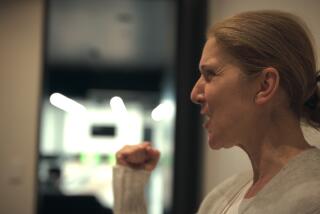Joan Didion documentary: Griffin Dunne on telling his aunt’s story
Joan Didion is famously press-shy. Now 79 and frail, she rarely grants in-depth interviews, even skipping glamorous events held in her honor.
Which is why her nephew, the actor Griffin Dunne, was taken aback when the author readily agreed to let him make a documentary about her.
“I laid it out for her, and then there was this four-second pause — an unreadable pause,” he recounted. “And she just said, ‘All right.’ And I said, ‘All right to this?’ And she said, ‘Yeah.’ Like, don’t make me say ‘yes’ again.”
On Wednesday, Dunne released a trailer for the yet-to-be-completed film, titled “We Tell Ourselves Stories in Order to Live” as part of Kickstarter campaign. Just hours after the financing drive went live, donations had already surpassed half of the $80,000 goal.
“I’ve always known she had a legion of fans that grows with every generation,” said Dunne, who is co-directing the project with Susanne Rostock, the filmmaker behind 2011’s Harry Belafonte documentary, “Sing Your Song.” “But I’m still taken aback by the response. Every time I get up to use the bathroom the number has gone up.”
Dunne is the son of late Vanity Fair writer Dominick Dunne, whose brother, author John Dunne, was married to Didion until his death in 2009. Growing up in California, Griffin Dunne was close to his aunt and uncle and often attended parties at their home as a teenager.
“They were always a good name drop when I was wooing a girl as a teenager,” he said with a chuckle. “They always included me in their social lives, and I was of course very aware of how important they were as writers.”
Since, he and Didion have remained close — particularly since the death of the elder Dunne brothers.
“It’s sort of like we’re the only two left, in a way — certainly in New York,” he said. “So we see each other a lot. She’s a very family-oriented person.”
So when Didion needed a promotional video made for 2011’s “Blue Nights” — a personal memoir about the death of her daughter, Quintana Roo, after the loss of her husband — she asked Dunne if he’d shoot it. Though he has primarily worked as an actor — best known for starring in the ’80s flicks “After Hours” and “An American Werewolf in London” — he was game. The project turned out so well that he decided to explore a feature-length documentary.
“Her prose is so visual and conducive to film — kind of like an audiobook for the eyes,” he said. “It just seemed like the next natural step. Plus, a documentary about her had never been made before. There was a certain obligation.”
Dunne says the film will be peppered with archival footage and will include a lot of Didion reading from her work, as well as interviews with the historical figures she wrote about. But those hoping to witness how the famous author spends her days — she’s currently penning a play for Scott Rudin — will be sorely disappointed.
Dunne is interviewing Didion for the film, however, and said his aunt has been “incredibly touched” by the response to the Kickstarter campaign. Initially, he feared she might back out when he asked her, for instance, to give away two pairs of her sunglasses that will be go to two individuals who donate $2,500 apiece.
“We felt very sheepish asking her, but she just went, ‘OK,’” he recalled. “She’s got a dish by the hall table where there are about six pairs of sunglasses lined up, and they go in revolving positions on her face depending on the light outside. It’s quite a big thing for her to part with them.”
Didion has always loomed large in Dunne’s mind. At numerous points in the interview, he described her as daunting, even though he said she has never given him any reason to fear her.
“To this day, I’ll still hear a question I ask her echo back in my head, like, ‘Oh, that’s a stupid question,’” he said. “But the things she’s written about in such depth — most mortals will never attain that kind of intellectual grace.”
Follow @AmyKinLA for Hollywood news and red carpet pics
More to Read
Only good movies
Get the Indie Focus newsletter, Mark Olsen's weekly guide to the world of cinema.
You may occasionally receive promotional content from the Los Angeles Times.











